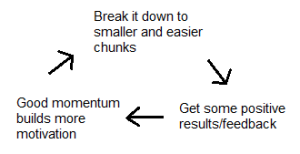A few years ago there was a famous quote that sports stars were using, in particular basketball players from the NBA. Kevin Durant, currently playing for Oklahoma City Thunder, said, “Hard work beats talent when talent fails to work hard.”
I would adjust this statement with the following, ‘smart work beats talent’.
What do most people mean when they talk about ‘hard work’? You may have heard people say something like ‘this person is really hard working’ or ‘this person is working hard’. I think what is really meant is a person who is consistently doing something over and over even though it might be challenging.
(That’s one hungry ant!) [1]
Hard work for most people has some kind of element of repetition and difficulty.
For example, when studying for a test, most people would say, ‘study hard for the test’ or ‘work hard for your exams’.
What is really being said here is, ‘make sure you repeatedly go over the content and practice what you know to prepare for the exam’.
There is nothing wrong with putting time and effort to practice what you know. Practice helps to reinforce what you know and gives you a chance to get better at it.
More often than not when doing a difficult task, for example studying a difficult concept, trying to go over it multiple times gives you the chance to overcome the initial hurdle. If you couldn’t succeed the first attempt, you might be able to the second, third, or like James Dyson the 5127th attempt.
Trouble with this approach is you have to have determination and a clear goal in mind. To stay determined over long period of time is very difficult. During the journey of repeating a task to get a specific goal, external factors may change your original goal.
The path of repetition can be helpful for some but for most people it can be demotivating to do something over and over.
What if you could avoid the excessive repetition and the difficulty and still get great results?
There are a few ways to avoid repetition
- Try to automate as much as possible either by building lasting habits, or through technology
- Have a tracking system to monitor progress
- Get help and delegate to others if possible
Try to take away as much thinking power needed for tasks which you are repeating so that you can really focus on the important aspects of the task.
With the mundane aspects of your task make them a series of habits. As Charles Duhigg mentions in his book ‘The Power of Habit’, to build or change habits you need a cue and a reward loop [2].
For example when studying, get the books you need and set them out on the table in the order you need them. Have all your equipment you are going to use in the same place, ready to use. When finishing your study session put everything you used away in the same place with the same sequence e.g. first books, then pens/pencils etc.
Have a system in place to monitor what you have been doing and check your progress.
This could be a simple checklist or a fancy spreadsheet, it is up to you. You may even want to monitor time taken, especially if you are doing past papers.
Below is an example of a checklist that you can use. It has been filled out as an example.
|
Date |
Time Spent | Topic | Good (tick)
Review (O) |
Comment |
| 05 Nov 2015 |
1.5 hrs |
Simultaneous eqns |
✓ |
know all the methods. |
Below is an example of what your spreadsheet might look like. This is only a brief template so adjust it how you like. It has been filled out as an example.
What would be even better than the above is if you have people who are there to help you. People who will help you stay on the right track and build the habits you need to succeed. People who will monitor your progress so all you have to do is show up and do the work.
These people could be your teachers, mentors, coaches, family and friends. Anyone who has had major success in any field has had a support network of people helping them to succeed.
If you are trying to pass an exam then why is it any different for you to not have a support team?
Overcoming difficulties
Main way to overcome difficulties is to break down the task into smaller manageable tasks.
Many people, such as Josh Kaufman in ‘The First 20 hours’, have detailed this step.
One of the key steps mentioned in the book is to remove any barriers to learning. Most people would get overwhelmed by a topic especially when they see no progress.
To prevent that from happening to you, set yourself up so that you can succeed in the task at hand.
Staying motivated will help you to build on any momentum gained from doing a challenging task.
This is what you want your cycle of doing challenging tasks to be:
Once you can accomplish this then you are doing smart work.
Beating talent
What do most people mean when they say someone is talented?
Generally, what is meant is that someone is really good at doing something so people just say ‘Oh they are just naturally gifted’ or ‘they are really talented at ___’
The thing is, nobody is ‘naturally talented’ at anything nor is anyone born with talent.
Many have spoken about this, Daniel Coyle in ‘The Talent Code’ and Geoff Colvin in ‘Talent is Overrated: What Really Separates World-Class Performers from Everybody Else’.
In an interview with Copyblogger, Dan Pink said “Don’t worry about what other people think. And work harder. You might not believe it right now, but persistence almost always trumps talent.”
The only thing I would tweak in this statement is to work smarter instead of harder.
This quote nicely emphasises the point I am making, smart work beats talent.
You don’t need to be ‘talented’ at maths to be great at it or get great results. For me, thinking you need ‘talent’ to be good at maths is a cop out to putting in the work required to get good at it.
The idea of ‘other people are just really good at maths’ is another way of saying I don’t want to put in the time and effort required.
Being called ‘talented’ is another way of capping someone’s ability because it puts them in a safety bubble which they can’t grow from.
Aim to be better than before instead of trying to be like someone who is ‘talented’ (whatever that means).
What should really be meant of someone who is talented, is someone who likes/interested in something and puts in a lot of time and effort to become good or even extraordinary at it.
Maths is a subject where anyone, including you, can do well if you take the right steps, work smart and are willing to put in the time needed to get better than before.
What are your thoughts on hard work vs smart work. What do you think you do more of and why? Let me know in the comments section.
Thanks for taking the time to read this.
References
[1] Picture from http://sujanpatel.com/business/the-truth-about-hard-work-and-entrepreneurial-success/
[2] Duhigg, C. (2012) The Power of Habit. New York: Random House.
Want a copy of this article? Sign up below and send me an email with subject line: I want this (name of article).
[yikes-mailchimp form=”2″ submit=”Submit”]
Join me to discover that you can improve in maths. (Hint: improving in maths, means you can improve in other things too)

Put your name down to engage with me and I'll show you how to overcome your barriers in maths.

